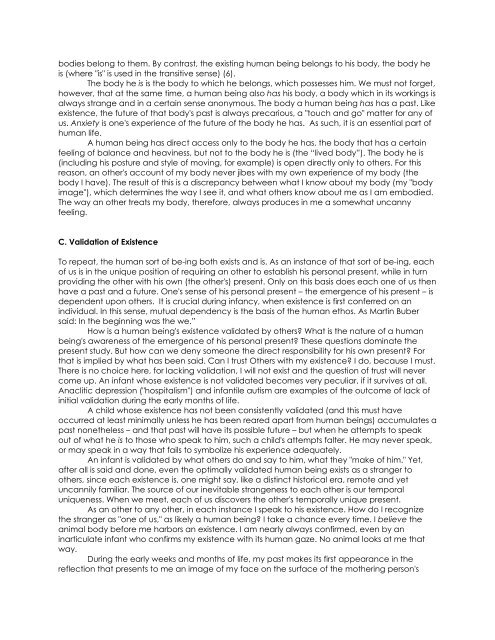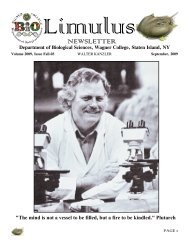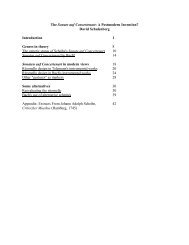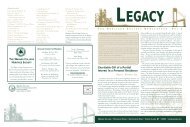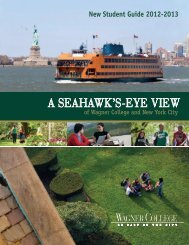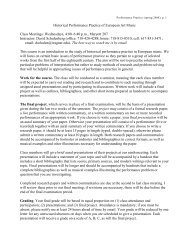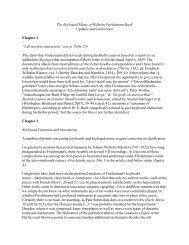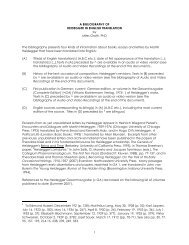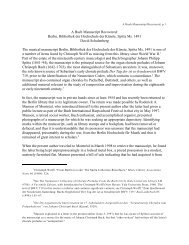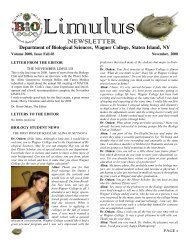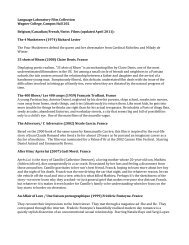SEVEN PAPERS ON EXISTENTIAL ANALYSIS ... - Wagner College
SEVEN PAPERS ON EXISTENTIAL ANALYSIS ... - Wagner College
SEVEN PAPERS ON EXISTENTIAL ANALYSIS ... - Wagner College
Create successful ePaper yourself
Turn your PDF publications into a flip-book with our unique Google optimized e-Paper software.
odies belong to them. By contrast, the existing human being belongs to his body, the body he<br />
is (where "is" is used in the transitive sense) (6).<br />
The body he is is the body to which he belongs, which possesses him. We must not forget,<br />
however, that at the same time, a human being also has his body, a body which in its workings is<br />
always strange and in a certain sense anonymous. The body a human being has has a past. Like<br />
existence, the future of that body's past is always precarious, a "touch and go" matter for any of<br />
us. Anxiety is one's experience of the future of the body he has. As such, it is an essential part of<br />
human life.<br />
A human being has direct access only to the body he has, the body that has a certain<br />
feeling of balance and heaviness, but not to the body he is (the “lived body”). The body he is<br />
(including his posture and style of moving, for example) is open directly only to others. For this<br />
reason, an other's account of my body never jibes with my own experience of my body (the<br />
body I have). The result of this is a discrepancy between what I know about my body (my "body<br />
image"), which determines the way I see it, and what others know about me as I am embodied.<br />
The way an other treats my body, therefore, always produces in me a somewhat uncanny<br />
feeling.<br />
C. Validation of Existence<br />
To repeat, the human sort of be-ing both exists and is. As an instance of that sort of be-ing, each<br />
of us is in the unique position of requiring an other to establish his personal present, while in turn<br />
providing the other with his own (the other's) present. Only on this basis does each one of us then<br />
have a past and a future. One's sense of his personal present – the emergence of his present – is<br />
dependent upon others. It is crucial during infancy, when existence is first conferred on an<br />
individual. In this sense, mutual dependency is the basis of the human ethos. As Martin Buber<br />
said: In the beginning was the we.”<br />
How is a human being's existence validated by others? What is the nature of a human<br />
being's awareness of the emergence of his personal present? These questions dominate the<br />
present study. But how can we deny someone the direct responsibility for his own present? For<br />
that is implied by what has been said. Can I trust Others with my existence? I do, because I must.<br />
There is no choice here, for lacking validation, I will not exist and the question of trust will never<br />
come up. An infant whose existence is not validated becomes very peculiar, if it survives at all.<br />
Anaclitic depression ("hospitalism") and infantile autism are examples of the outcome of lack of<br />
initial validation during the early months of life.<br />
A child whose existence has not been consistently validated (and this must have<br />
occurred at least minimally unless he has been reared apart from human beings) accumulates a<br />
past nonetheless – and that past will have its possible future – but when he attempts to speak<br />
out of what he is to those who speak to him, such a child's attempts falter. He may never speak,<br />
or may speak in a way that fails to symbolize his experience adequately.<br />
An infant is validated by what others do and say to him, what they "make of him." Yet,<br />
after all is said and done, even the optimally validated human being exists as a stranger to<br />
others, since each existence is, one might say, like a distinct historical era, remote and yet<br />
uncannily familiar. The source of our inevitable strangeness to each other is our temporal<br />
uniqueness. When we meet, each of us discovers the other's temporally unique present.<br />
As an other to any other, in each instance I speak to his existence. How do I recognize<br />
the stranger as "one of us," as likely a human being? I take a chance every time. I believe the<br />
animal body before me harbors an existence. I am nearly always confirmed, even by an<br />
inarticulate infant who confirms my existence with its human gaze. No animal looks at me that<br />
way.<br />
During the early weeks and months of life, my past makes its first appearance in the<br />
reflection that presents to me an image of my face on the surface of the mothering person's


